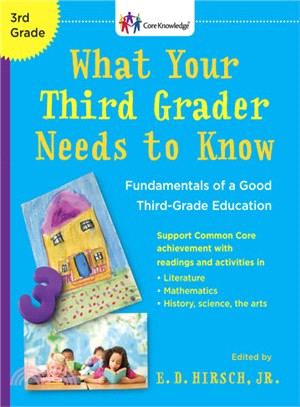目前查詢
歷史查詢

What your third grader needs to know :fundamentals of a good third-grade education /
作者 : Hirsch, E. D.,1928- . ,(Eric Donald),
出版社 : Bantam Dell Pub.,
出版年 : 2002
ISBN:9780385336260
- 館藏(3)
- 書目資訊
- 心得(0)
- 機讀格式
- 標籤
書名 : What your third grader needs to know :fundamentals of a good third-grade education /
紀錄類型 : 書目-語言資料,印刷品: 單行本
正題名[資料類型標示]/作者 : What your third grader needs to know :edited by E.D. Hirsch, Jr.
其他題名 : fundamentals of a good third-grade education /
其他題名 : What your 3rd grader needs to know.
其他作者 : Hirsch, E. D.(Eric Donald),
版本項 : Rev. ed.
出版者 : New York :Bantam Dell Pub.,2002, c2001.
面頁冊數 : xxviii, 366 p. :ill. (some col.), maps (some col.) ;24 cm.
附註 : Includes index.
標題 : Curriculum planning
ISBN : 9780385336260 (pbk.) :
集叢項 : Core knowledge series.
LEADER 02167nam 2200205 a 4500
001 295846
003 TNML
005 20131113103536.0
008 180321t20022001nyuab 001 0 eng d
020 $a9780385336260 (pbk.) :$cNT$700$
035 $a783935
040 $aCGP$cCGP$dOMP$dOCL$dOCLCQ$dDLC
082 00$a372.19
245 00$aWhat your third grader needs to know :$bfundamentals of a good third-grade education /$cedited by E.D. Hirsch, Jr.
246 3 $aWhat your 3rd grader needs to know.
250 $aRev. ed.
260 $aNew York :$bBantam Dell Pub.,$c2002, c2001.
300 $axxviii, 366 p. :$bill. (some col.), maps (some col.) ;$c24 cm.
490 1 $aCore knowledge series.
500 $aIncludes index.
520 $aThe best way to nurture your child's reading and writing abilities is to provide rich literary experiences and find frequent and varied opportunities to work and play with language. By the end of second grade, children have developed a reading vocabulary of familiar words and can decode the letter-sound patterns of many unfamiliar one- and two- syllable words. During third grade, as they increase their knowledge about words (including the concepts of syllables, prefixes, and suffixes), they put that knowledge to work, decoding unfamiliar multisyllabic words. If a child has not mastered the skill of decoding simple words, that practice should continue. By third grade, the mental process of turning letters into sounds should be nearly automatic. This year, children focus more on meaning as they read. Their reading vocabulary expands tremendously, as does their ability to read longer and more complex literature. They read for information and begin to use nonfiction reference books like children's dictionaries and encyclopedias. They learn the distinction between fiction and nonfiction, and they read and enjoy longer and more complicated "chapter books." In third grade, children continue to learn about language as they write it: identifying parts of speech, properly using punctuation, and recognizing sentence types. They begin to shape their own writing, understanding how paragraphs relate in a larger whole and exerting more control over vocabulary and structure.
650 0$aCurriculum planning$zUnited States.
650 0$aThird grade (Education)$xCurricula$zUnited States.
700 1 $aHirsch, E. D.$q(Eric Donald),$d1928- .
